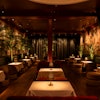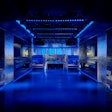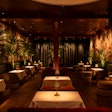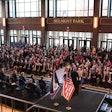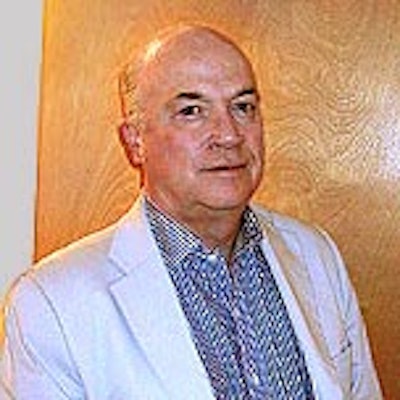
Grab a waiter at one of New York's toniest benefits, and ask him where he's from. Odds are, he'll tell you Glorious Food, the high-class caterer that serves Manhattan's glitziest galas and cultural events (maybe you've heard of the Costume Institute benefit, or the Robin Hood Foundation gala, or the Metropolitan Opera's opening night?).
After 30 years of feeding New York's upper crust, Glorious Food founder Sean Driscoll has built one of the most well-known brands in the special events industry. (You don't have to order meals by the dozen to recognize the Glorious Food name.) While including Driscoll in its recent "Gay Power 101" list of prominent gay New Yorkers, New York magazine called Glorious Food "the preeminent caterer in town," and having a Glorious Food truck parked outside an event is as much of a status symbol as carrying Louis Vuitton luggage or wearing Manolo Blahniks.
"We have an amazing repeat business and we automatically get every opening there is to get," Driscoll says. But while his privately held company caters about 3,000 events a year--earning an estimated $12 million in annual revenue--and he claims he doesn't pay attention to his competitors, Driscoll says he hasn't become complacent. "We have an opening night every night," he says repeatedly during an interview in his Upper East Side office, which is filled with art done by Glorious Food caterwaiters during their non-serving time. And while a client roster like his could make someone cocky, Driscoll stresses the importance of good service, and still seems genuinely excited when talking about catering a big cultural event like the opening night of the New York City Ballet. He also talked to us about training the company's 500 waiters, the perfect pace of an event, and how the economy is affecting his business:
BiZBash: How did you start Glorious Food?
Sean Driscoll:It started as a small company working out of my apartment. I had been in advertising and TV, and I had a lot of production background. I wanted to become a film director, actually. Then I got sidetracked by getting involved in this catering business, and the more I got involved in it, the more I liked it...It's kind of like show business in a way. We have an opening night every night...Because I grew up in New York, I had a lot of New York contacts, and I was able to use that. But people will hire you [because of your relationship] once. [To get them to hire you again] you have to be at the top of your game. I went after a very high-end market, and I've stayed in that market.
I think we are probably responsible for that attractive caterwaiter look [that many companies have now]. I went to all the casting agents that I used to deal with when I was casting commercials, because I knew that most of the actors were waiters or waitresses when they weren't studying to be an actor. So I started that, and I think everybody else caught on.
You've been catering some events--the Costume Institute benefit, for example--for 20 years. Why do customers keep coming back to you?
Because nobody can do it like we can. Nobody has the follow-up, the production, the details. We've built up a very firm client base who really trusts us. And yet we're living in a town where they're all looking for the new kid on the block--I was the new kid on the block--and I'm constantly turning around to see the next Sean Driscoll. There have been a few, but they never last.
What do New York partygoers expect when they hear that Glorious Food is catering an event?
They expect the food to be good, and they expect the service to be good, and if it's not, then we're obviously going to be criticized. It's a cliche, but I run the company as if every night is opening night, you're only good as your last souffle--all these ridiculous sayings, but they all make sense. The client hires you for three hours; it's a memory the next day. There isn't anything I can do the next day if there was too much salt in the salad dressing. All I can do is apologize. We just want to make every event, every day, perfect.
How much cachet does the Glorious Food name have to that partygoer?
I think it has a lot. It means that people spent a little bit more money and there's a well-oiled machine behind the event. I think we've become a marketing tool for a lot of our clients...We are aware of our competition, but we're not driven by them. We're only driven by ourselves. I couldn't tell you the names of most of my competitors. I know the companies, but I have no idea who the people are behind them.
What are your customers asking for right now? Is the economy affecting prices?
I hate saying this, but our client is protected from the economy. Things have to open in New York, regardless of the economy. If my business depended upon the fashion industry, I would be in very big trouble, because they go up and down all the time. But we do fashion things, and we have all of the fashion greats as personal clients.
Are people now requesting lower prices than what they paid last year?
For a big event, yes. But not private events.
How do you respond?
I ask them, "How much have you got, and I'll call you back." I do my own calculations. But that's basically because they're repeat business. It's not somebody who comes out of nowhere and just calls us.
How important is the food to the overall success of an event?
I think living in New York people are obsessed with food. It's very important. People's expectations when they go to these events [can be low] because the majority of these events take place in hotels, and I don't think that the level of hotel catering is at the same level as off-premise catering.
Why is that?
Because most of the hotels are owned by conglomerates, and there's that barrier between the worker and the boss. And they don't have time to sit down and go over every detail the way we go over every detail. They've come a long way, but they're not to the level of what we can produce.
What's more important to the overall success of an event--the taste of the food, or the way it's served?
Both. Everyone looks at me when they see me [at an event] and they say, "When am I getting out of here?" So if you go to an 8 o'clock event--I'm talking about a seated dinner now--you really have to start pushing them in by quarter of 9 so they're actually at the table at 9. We try to get them fed in an hour and 25 minutes, but then you have speakers in between, and then you get it up to two hours. Everybody feels it's a great event if they're out of there by quarter to 11. If it's anytime after 11:30, the event then gets very bad marks the next day.
I tell new people, "Food is 50 percent, and service is 50 percent. You can't have one without the other."
What are the differences between working with corporate and nonprofit clients?
Budget.
Are the expectations any different?
No, they're both the same. I think it's easier to work with corporate clients because they have less time. I tell a story about when I first started: My accountant showed up 20 minutes early for an appointment. So he's standing outside my office, and I waved him in. I was talking to somebody on the phone, and I finally hung up a half hour later. He said, "Oh, so now I know what you do. You talk about.phparagus for a half hour."
So that's what we do with our average customer. But when a corporation calls, it's all very businesslike. On the other side of the fence, the [private] customer is constantly changing their mind--what kind of china should we use, and all that kind of stuff, which is part of the we're all about--we're there for them. I kind of feel like we're like psychiatrists. People give us all their Sturm and Drang, and we clean it up and do an event for them.
But we're working with a lot of people. It's not just us, it's the florist, the lighting person, the tent person. We're the person that night. Even Robert Isabell has already done his job. We're continuing where everybody else has left off. In the end we kind of become responsible for everybody, because we're the people who are there at the moment. Sometimes when I walk into a room and somebody says, "Sean, can you do something about the air conditioning?" That isn't why I was hired, [but] I do what I can do.
Posted 08.14.01
More from this interview:
Sean Driscoll talks about training caterwaiters...
Recent Glorious Food-catered events we've covered:
The Museum of Modern Art and the Whitney's Mies van der Rohe exhibits opening gala...
The Costume Institute benefit...
The Robin Hood Foundation benefit...
The PEN Literary Gala...
After 30 years of feeding New York's upper crust, Glorious Food founder Sean Driscoll has built one of the most well-known brands in the special events industry. (You don't have to order meals by the dozen to recognize the Glorious Food name.) While including Driscoll in its recent "Gay Power 101" list of prominent gay New Yorkers, New York magazine called Glorious Food "the preeminent caterer in town," and having a Glorious Food truck parked outside an event is as much of a status symbol as carrying Louis Vuitton luggage or wearing Manolo Blahniks.
"We have an amazing repeat business and we automatically get every opening there is to get," Driscoll says. But while his privately held company caters about 3,000 events a year--earning an estimated $12 million in annual revenue--and he claims he doesn't pay attention to his competitors, Driscoll says he hasn't become complacent. "We have an opening night every night," he says repeatedly during an interview in his Upper East Side office, which is filled with art done by Glorious Food caterwaiters during their non-serving time. And while a client roster like his could make someone cocky, Driscoll stresses the importance of good service, and still seems genuinely excited when talking about catering a big cultural event like the opening night of the New York City Ballet. He also talked to us about training the company's 500 waiters, the perfect pace of an event, and how the economy is affecting his business:
BiZBash: How did you start Glorious Food?
Sean Driscoll:It started as a small company working out of my apartment. I had been in advertising and TV, and I had a lot of production background. I wanted to become a film director, actually. Then I got sidetracked by getting involved in this catering business, and the more I got involved in it, the more I liked it...It's kind of like show business in a way. We have an opening night every night...Because I grew up in New York, I had a lot of New York contacts, and I was able to use that. But people will hire you [because of your relationship] once. [To get them to hire you again] you have to be at the top of your game. I went after a very high-end market, and I've stayed in that market.
I think we are probably responsible for that attractive caterwaiter look [that many companies have now]. I went to all the casting agents that I used to deal with when I was casting commercials, because I knew that most of the actors were waiters or waitresses when they weren't studying to be an actor. So I started that, and I think everybody else caught on.
You've been catering some events--the Costume Institute benefit, for example--for 20 years. Why do customers keep coming back to you?
Because nobody can do it like we can. Nobody has the follow-up, the production, the details. We've built up a very firm client base who really trusts us. And yet we're living in a town where they're all looking for the new kid on the block--I was the new kid on the block--and I'm constantly turning around to see the next Sean Driscoll. There have been a few, but they never last.
What do New York partygoers expect when they hear that Glorious Food is catering an event?
They expect the food to be good, and they expect the service to be good, and if it's not, then we're obviously going to be criticized. It's a cliche, but I run the company as if every night is opening night, you're only good as your last souffle--all these ridiculous sayings, but they all make sense. The client hires you for three hours; it's a memory the next day. There isn't anything I can do the next day if there was too much salt in the salad dressing. All I can do is apologize. We just want to make every event, every day, perfect.
How much cachet does the Glorious Food name have to that partygoer?
I think it has a lot. It means that people spent a little bit more money and there's a well-oiled machine behind the event. I think we've become a marketing tool for a lot of our clients...We are aware of our competition, but we're not driven by them. We're only driven by ourselves. I couldn't tell you the names of most of my competitors. I know the companies, but I have no idea who the people are behind them.
What are your customers asking for right now? Is the economy affecting prices?
I hate saying this, but our client is protected from the economy. Things have to open in New York, regardless of the economy. If my business depended upon the fashion industry, I would be in very big trouble, because they go up and down all the time. But we do fashion things, and we have all of the fashion greats as personal clients.
Are people now requesting lower prices than what they paid last year?
For a big event, yes. But not private events.
How do you respond?
I ask them, "How much have you got, and I'll call you back." I do my own calculations. But that's basically because they're repeat business. It's not somebody who comes out of nowhere and just calls us.
How important is the food to the overall success of an event?
I think living in New York people are obsessed with food. It's very important. People's expectations when they go to these events [can be low] because the majority of these events take place in hotels, and I don't think that the level of hotel catering is at the same level as off-premise catering.
Why is that?
Because most of the hotels are owned by conglomerates, and there's that barrier between the worker and the boss. And they don't have time to sit down and go over every detail the way we go over every detail. They've come a long way, but they're not to the level of what we can produce.
What's more important to the overall success of an event--the taste of the food, or the way it's served?
Both. Everyone looks at me when they see me [at an event] and they say, "When am I getting out of here?" So if you go to an 8 o'clock event--I'm talking about a seated dinner now--you really have to start pushing them in by quarter of 9 so they're actually at the table at 9. We try to get them fed in an hour and 25 minutes, but then you have speakers in between, and then you get it up to two hours. Everybody feels it's a great event if they're out of there by quarter to 11. If it's anytime after 11:30, the event then gets very bad marks the next day.
I tell new people, "Food is 50 percent, and service is 50 percent. You can't have one without the other."
What are the differences between working with corporate and nonprofit clients?
Budget.
Are the expectations any different?
No, they're both the same. I think it's easier to work with corporate clients because they have less time. I tell a story about when I first started: My accountant showed up 20 minutes early for an appointment. So he's standing outside my office, and I waved him in. I was talking to somebody on the phone, and I finally hung up a half hour later. He said, "Oh, so now I know what you do. You talk about.phparagus for a half hour."
So that's what we do with our average customer. But when a corporation calls, it's all very businesslike. On the other side of the fence, the [private] customer is constantly changing their mind--what kind of china should we use, and all that kind of stuff, which is part of the we're all about--we're there for them. I kind of feel like we're like psychiatrists. People give us all their Sturm and Drang, and we clean it up and do an event for them.
But we're working with a lot of people. It's not just us, it's the florist, the lighting person, the tent person. We're the person that night. Even Robert Isabell has already done his job. We're continuing where everybody else has left off. In the end we kind of become responsible for everybody, because we're the people who are there at the moment. Sometimes when I walk into a room and somebody says, "Sean, can you do something about the air conditioning?" That isn't why I was hired, [but] I do what I can do.
Posted 08.14.01
More from this interview:
Sean Driscoll talks about training caterwaiters...
Recent Glorious Food-catered events we've covered:
The Museum of Modern Art and the Whitney's Mies van der Rohe exhibits opening gala...
The Costume Institute benefit...
The Robin Hood Foundation benefit...
The PEN Literary Gala...


